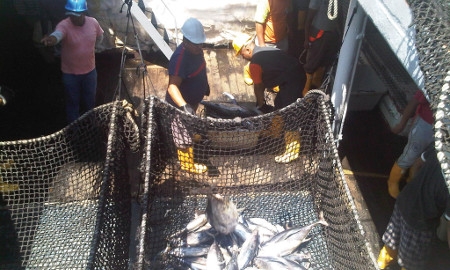Located in a privileged location in the Posorja district, only 100 kilometers from Guayaquil, is the strategic center of the national tuna industry where dozens of fishing boats arrive at the Ecuadorian coast on a daily basis. Of the local population, 80% work in the fishing industry and the three main companies in the sector are based there, where they process 70% of the production and exportation of Ecuadorian tuna, namely: Negocios Internacionales Reales S.A. (Nirsa), Salica del Ecuador, and Empresa Pesquera Ecuatoriana (Empesec).
Salica del Ecuador, part of the Spanish group Albacora has been a guarantee of excellence since 2002 in the tuna industry off the coasts of Ecuador. The group sells tinned food and frozen fish and is the second largest exporter of tuna in the world.
The company has created more than 2,000 jobs and has invested more than $70 million in Ecuador. However the investments are not solely focused on the tuna industry: Alimport, another company created by the Albacora group, is behind the construction of the largest deepwater port in the country in Posorja to enable the international movement of cargo and containers. The company’s investment in the project tops $500 million.
Reaching its peak
Ecuador’s fishing industry is on the rise. In the first nine months of 2012 it grew 23% on the same period of a year earlier, making it worth $792 million. The main part of this increase can be explained by a worldwide rise in the price of tuna. At the same time, the fishing of tuna in Ecuador only reached 150,000 tons, a decrease by 30,000 tons on previous years, so the industry had to acquire 200,000 extra tons of tuna from Asian markets such as Korea and Taiwan to maintain levels of production. However, this imported raw material can then not be counted as an export exempt from European Union taxes.
Although the U.S. and Europe are the main destinations for Ecuadorian tuna exports, the neighboring Latin American countries are potentially becoming important markets.
| Salica has created more than 2000 jobs and invested more than $70 million in Ecuador |
Salica depends on exports, and Europe and the U.S. are its main markets. Nevertheless, Latin American countries are becoming more and more important and it is beginning to see success in markets like Costa Rica and Brazil. It has also started to make advances in Ecuador with its own brand of value-added products such as tuna with vegetables. The company has a refrigeration unit in Ecuador with a capacity for more than 1,500 tons of this product. The group also owns one of Europe’s biggest fishing fleets with 15 large tuna boats and five merchant ships. This allows Salica to catch more than 100,000 tons of fish per year. The company is a beacon for effort and success in a globalised world: it is the only company that fishes in all the oceans and serves all of the major tuna consumer markets globally.
Among the main objectives of the company is the culmination, scheduled for the end of 2013, of the General System of Preferences (SGP Plus), that will free Ecuadorian exports of duties on entrance into the European Union, and this will take away competition on the sales within the fishing industry. At the moment the situation negatively affects the Basque company by obliging it to acquire raw materials from third parties and pushing up costs by 5%.

1 COMMENT
Shame no more japanese investment.. Ecuador and Japan share some offshore fish species such as tuna, sharks, swordfish & giant squid..